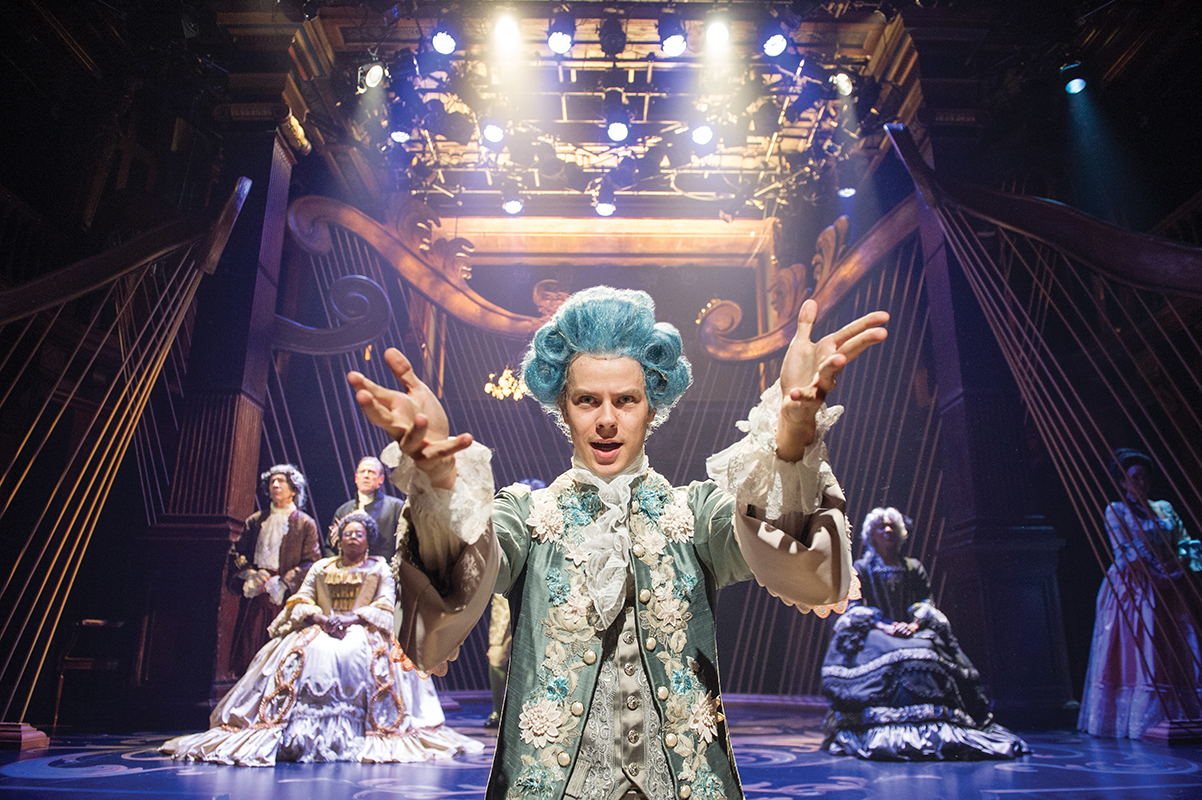Review: ‘Amadeus’ at Folger Theatre
Folger's "Amadeus" offers an entertaining flight of historical fancy in the fictitious battle of Salieri v. Mozart.

In the current climate of fake and thoroughly feral news, Peter Shaffer’s Amadeus (★★★☆☆) touches something of a nerve. A comic-tragic flight of historical fancy, it offers some very unsubstantiated ideas about some very real people. In Shaffer’s vision, the elderly and ailing 17th-century composer Antonio Salieri recalls a rivalrous, dangerous obsession with the young and far more talented Mozart. It may be a vehicle for a robust, sometimes amusing display of ruinous envy, but in this unironic, anti-fact age, the 1979 play feels in need of a very big disclaimer: “Just messing around folks; it didn’t really happen!”
Assuming Shaffer’s folly is taken for what it is, there’s a cerebral entertainment in playing witness to Salieri as he wallows in his outrage at the immense talent bestowed on Mozart. Conceived here as a precocious, immature brat who, by all rights, seems wholly unworthy, there is comedy as well as chagrin to be had. And the characterization goes some way in making sense of an actual truth about Mozart: that he enjoyed some pretty base scatological humor when he wasn’t composing some of the most beautiful music the world has ever known.
If not exactly a witty knee-slapper, Shaffer brings a wry voice and a style of story-telling that is light on its feet. There is schadenfreude aplenty in watching not just the arrogant Mozart go down (as Salieri orchestrates his professional demise), but also Salieri himself, as he ages into regret. But what intrigues most in Amadeus is Salieri’s heartache in being just smart enough to recognize his own mediocrity. His monologues — on the fine line between talent and genius and the way in which great music feels supernatural in its power — are potent.
Less exciting is Salieri’s increasingly feverish conviction that life’s unfairness is due to a cruel (and personal) God, with Shaffer showing his own hand in letting God have the last word. Although it may be a crowd-pleaser, it limits the play. There are far more interesting ideas in the offing, such as how religion might serve as a defense mechanism for vulnerable egos navigating a harsh and capricious world, the reaction this Salieri might have had to such a possibility.
The choice to stop at God versus the psyche also leaves the play with the challenge of keeping Salieri’s agony worth watching. With the Folger production clocking in at nearly three hours, it’s a challenge that goes into bold italics as the evening draws out. For Ian Merrill Peakes, it is met in delivering his Salieri with an indefatigable agitation that ebbs, flows and reaches crescendos as if anger could be scored like an opera. As a performance in one key, it is accomplished, but to try and connect with it is another matter. The agitation is almost too unrelenting, and it argues with Salieri’s pleasingly sarcastic and ironic edge. And it is a fine line — at times the lily is gilded with too staged a look here or a too long a pause there. Peakes can be a very subtle actor, but it feels as if this Salieri drives too hard.

As his unwitting nemesis, the young and giddy Mozart, Samuel Adams’ portrayal is intriguing and quite memorable with its blend of arrogance, naiveté and a disarming, hyena-like laugh. But the necessary frisson with Peakes’ Salieri appears only in fits and starts and his chemistry with wife Constance doesn’t convince. This isn’t necessarily on Adams; Shaffer’s treatment can feel more like vignettes than an emotional journey and there aren’t many scenes in which to get a fuller sense of this strange young man. Of course, therein lies the challenge for director Richard Clifford. One can sense the overall goals, but the execution doesn’t always work in the moment.
Case in point is the scene in which Amadeus finds Constance caving into the saucy parlor games of the two gossips, the Venticellos. The moment is probably meant to reveal Amadeus’ philandering and his complex relationship with Constance, but it falls completely flat. The deadly serious Mozart seems suddenly out of character, Constance’s moment of humiliation is overly indulged, and the Venticellos’ snipe at the end is too forced.

This unevenness appears again with Count Orsini-Rosenberg, a quietly disapproving member of court. Orsini doesn’t say much, but when he does, it’s prime real estate. James Joseph O’Neil gets that Orsini’s comments needs laser-like timing but writes him too small to deliver either the laughs or the venom. As for the court gossips, who set the scene and serve as tonal bookends, if Louis Butelli gives his Venticello some foppish flair, Amanda Bailey offers no discernible snark. And if Lilli Hokama’s Constance is a strong presence and eventually gives some sense of a personality, her playfulness with Mozart never rings true. Without more of a connection, it’s very hard to believe her grief when Mozart eventually dies. Although none of these issues rise to the level of bad, taken together, they do little to carry the tale or complement Peakes’ intensity.
All told, it’s a longish evening that nevertheless entertains, provokes some thought, and offers a few moving moments courtesy of Mozart’s music. Just resist the urge to edit Wikipedia after seeing it.
Amadeus runs through Dec. 22 at the Folger Theatre, 201 East Capitol St. SE. Tickets are $42 to $95. Call 202-544-7077 or visit www.folger.edu.
Support Metro Weekly’s Journalism
These are challenging times for news organizations. And yet it’s crucial we stay active and provide vital resources and information to both our local readers and the world. So won’t you please take a moment and consider supporting Metro Weekly with a membership? For as little as $5 a month, you can help ensure Metro Weekly magazine and MetroWeekly.com remain free, viable resources as we provide the best, most diverse, culturally-resonant LGBTQ coverage in both the D.C. region and around the world. Memberships come with exclusive perks and discounts, your own personal digital delivery of each week’s magazine (and an archive), access to our Member's Lounge when it launches this fall, and exclusive members-only items like Metro Weekly Membership Mugs and Tote Bags! Check out all our membership levels here and please join us today!






















